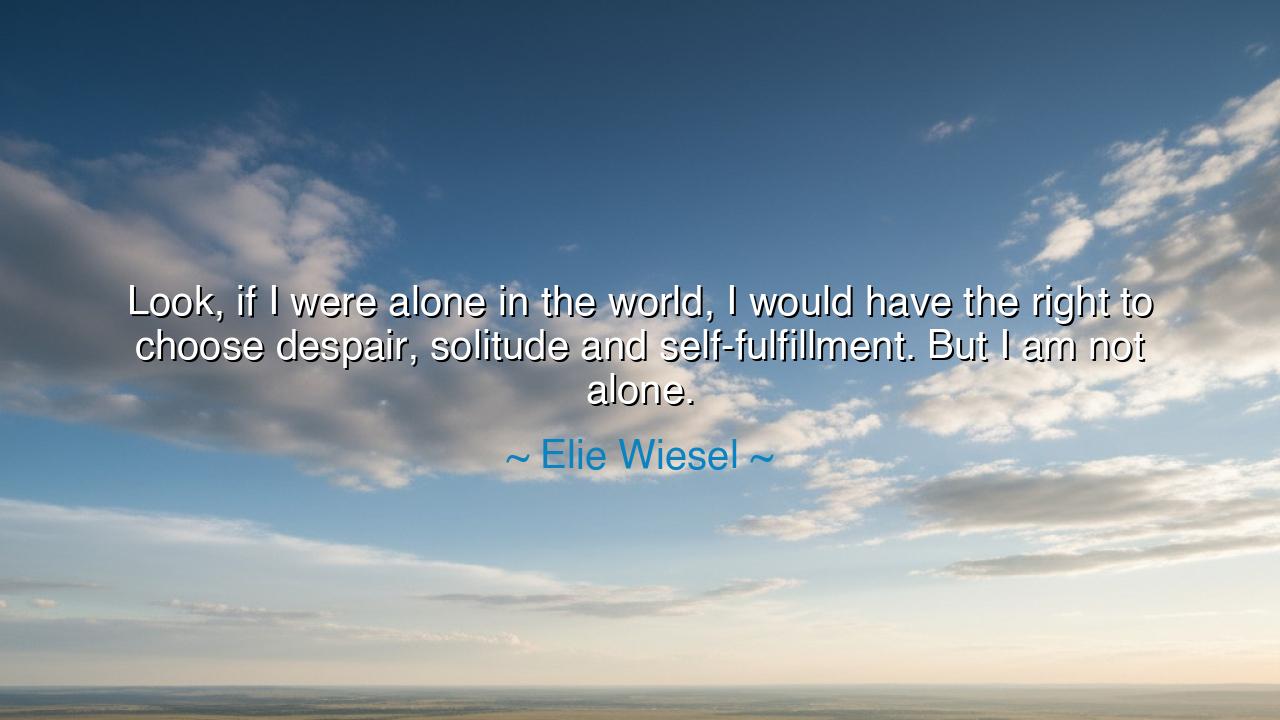
Look, if I were alone in the world, I would have the right to
Look, if I were alone in the world, I would have the right to choose despair, solitude and self-fulfillment. But I am not alone.






“Look, if I were alone in the world, I would have the right to choose despair, solitude and self-fulfillment. But I am not alone.” — thus spoke Elie Wiesel, the survivor, the witness, the poet of suffering and faith. His words are not the lament of a weary soul, but the creed of one who has looked into the abyss and chosen responsibility over despair. In them resounds the wisdom of a man who endured what should have destroyed all hope, yet emerged bearing light for others. He reminds us that the freedom to despair belongs only to those who imagine themselves separate from their fellow beings — but none of us are separate. To be human is to be bound in shared destiny, to carry the weight of one another’s pain and possibility.
The origin of this quote lies in the ashes of the Holocaust, where Wiesel, still a boy, saw the world stripped of all illusions. He beheld death without mercy, cruelty without meaning, and silence from the heavens that once seemed full of song. He could have chosen bitterness, isolation, or the dark comfort of indifference. Yet instead, he chose remembrance — and in remembrance, compassion. For he knew that to live after such horror is not merely to survive, but to testify, to affirm life even when it trembles. His words declare a truth carved by fire: that we are responsible for one another, and that despair, while tempting, is a betrayal of that sacred bond.
To say “I am not alone” is both a confession and a vow. It is the recognition that our choices ripple outward, touching lives unseen. Despair may feel private, but its consequences are never solitary. When one person loses hope, a light goes out that might have guided another. Thus, to choose despair is to withdraw from the great human chorus; to choose engagement is to keep the song alive. Wiesel’s words teach that our duty is not merely to feel, but to act, to transform our pain into purpose. The self may long for solitude, for retreat from the wounds of the world — yet love demands that we return, again and again, to the living.
Consider the story of Václav Havel, the Czech playwright who endured imprisonment under tyranny. He, too, could have turned inward, protecting his soul from the cruelty of men. But like Wiesel, he refused despair. “Hope,” he wrote, “is not the conviction that something will turn out well, but the certainty that something makes sense, regardless of how it turns out.” Havel understood that to live with others is to carry meaning even through suffering. It is not optimism that sustains the world, but solidarity — the quiet, stubborn faith that one’s courage can lift another’s heart, and another’s courage can lift one’s own.
Wiesel’s quote carries within it a rebuke to the age of self. In a world that celebrates isolation, that tells us to seek our own fulfillment above all, he reminds us that such freedom is hollow if it leaves others behind. True humanity is not found in self-perfection, but in mutual care. The one who seeks only their own peace will find only emptiness; the one who bears another’s burden will find meaning that endures. The ancient prophets spoke the same truth in another tongue: that no man can call himself righteous while his neighbor suffers.
To live as though “I am not alone” is to walk with reverence among others, to understand that every gesture is moral, every silence consequential. When you speak, you shape the world’s hope; when you turn away, you deepen its darkness. Wiesel, who once saw humanity’s light dim nearly to extinction, urges us to tend that light — not for our own comfort, but for the generations yet to come. We owe one another the refusal to despair. We owe one another courage.
The lesson, then, is both simple and sacred: we are bound together, and from that bond flows both our suffering and our salvation. If you are tempted to retreat into solitude, remember that your life is part of a greater story — one that began before you and will continue after. To live rightly is not to escape the world, but to serve it; not to surrender to despair, but to defy it through compassion. When you lift another from darkness, you redeem a piece of your own soul.
So let these words of Elie Wiesel echo within you: “But I am not alone.” Speak them in moments of sorrow, in days of weariness. Let them remind you that your strength belongs not to you alone, but to the human family — fragile, beautiful, eternal. And when the choice comes — as it comes to all — between despair and duty, between solitude and love, may you remember his example, and choose, as he did, to stand with the living, and to keep the light alive.






AAdministratorAdministrator
Welcome, honored guests. Please leave a comment, we will respond soon